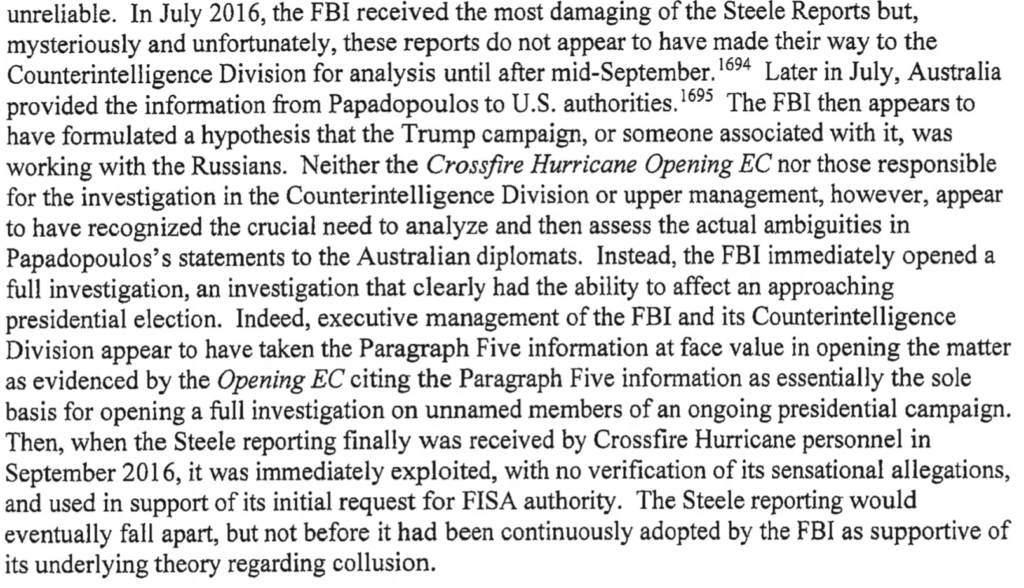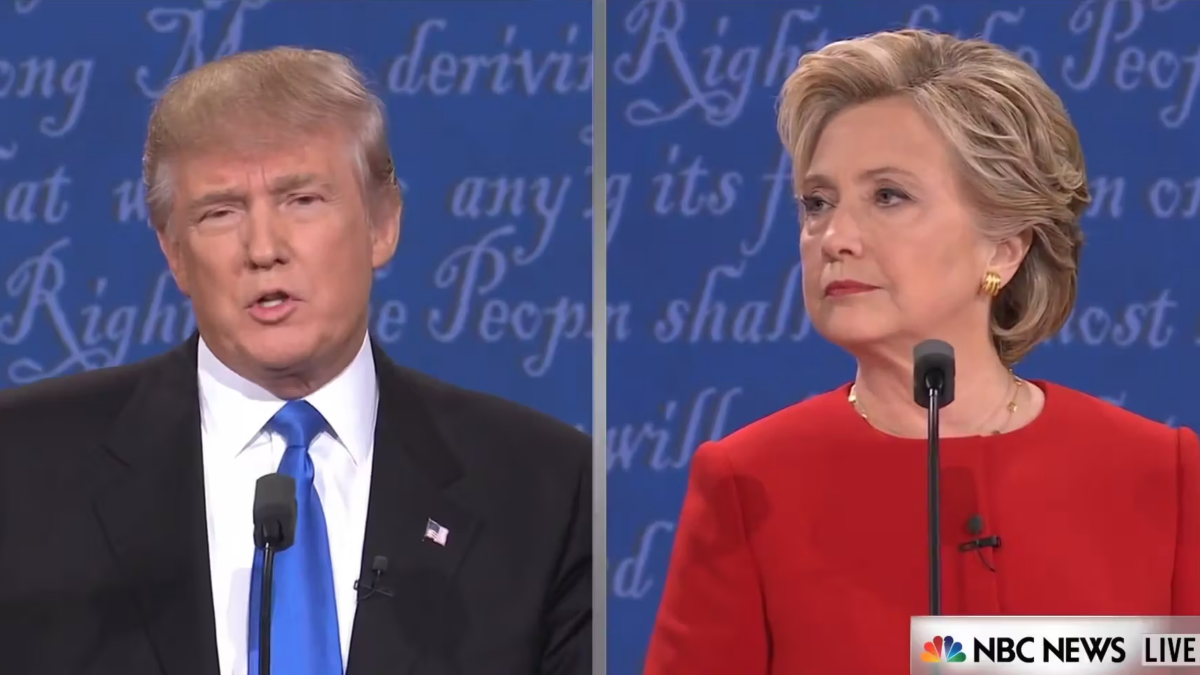Special Counsel John Durham has finally completed his long-awaited report on the 2016 election and related rot emanating from the FBI and intelligence agencies, and it contains some pretty damning conclusions. A few were already fairly obvious: The Steele dossier was a joke, Obama’s FBI was rabidly attempting to spy on the regime’s enemies, intelligence agencies apparently had zero evidence of collusion when they opened Crossfire Hurricane, and this action “had the potential of affecting the 2016 election.”
But woven throughout the report’s many revelations is a theme condemning the same feds who have appointed themselves the arbiters of all they consider “mis-, dis-, and malinformation.” In short, it’s the powerful members of the Department of Justice — not some random QAnon Facebookers or moms who show up to talk at school board meetings — that are the biggest believers and purveyors of misinformation. When the feds received false information that supported their biases about Donald Trump, Russia, and the 2016 election, they gobbled it up hook, line, and sinker, no matter how unreliable the source or suspect the information.
The dossier from former British spy Christopher Steele is a prime example. According to Durham’s report, the FBI “ultimately was not able to confirm or corroborate any of the substantive allegations contained in [Steele’s] reports” but used them anyway as a pretext to spy on the Trump campaign.
Even Steele’s primary sub-source, Russian national Igor Danchenko, who bragged about being the source for 80 percent of Steele’s “intel,” couldn’t corroborate Steele’s claims. In fact, Danchenko’s story didn’t match what Steele had previously told the FBI, but agents never told the Foreign Intelligence Surveillance Court about these inconsistencies when applying for warrants to spy on Trump campaign adviser Carter Page. And when the feds learned that Danchenko had lived stateside for years, despite repeated claims he was Russia-based, they not only didn’t correct the error in their FISA applications, but they adopted Danchenko as a confidential human source, paying him for info that didn’t corroborate the Steele dossier in the least.
But the FBI had more important things to do than verify the veracity of information. After all, they had Trump associates to spy on. They needed a pretext, Steele and Danchenko provided it, and the FBI ran with it, answering the question of whether they give a hoot about sniffing out real disinformation.
Maybe, maybe it would be one thing for America’s top intel agents and investigators to get sidetracked by sophisticated info ops from foreign adversaries containing impenetrable layers of deception. But this isn’t the FBI getting tripped up by misinformation per se — it’s the feds sprinting with it. Here’s more from Durham’s report:

Notice the order of events here. The FBI dreams up a hypothesis that Trump or his allies colluded with the Russians. But instead of doing the “crucial” work of analyzing and assessing contradictions, ambiguities, and other inconsistencies in the disinformation they were receiving, the feds took it at “face value” and “immediately” launched a full-tilt investigation into members of an opposing party’s presidential campaign, which had the obvious potential to undermine the self-governing fabric of our republic by interfering in an election.
Steele’s dossier — the “sensational allegations” of which were never verified — ultimately crumbled, but as Durham wrote, “not before it had been continuously adopted by the FBI as supportive of its underlying theory regarding collusion.”
In other words, the overarching takeaway from the Durham report is that the FBI’s Russia hoax was straight disinformation. And the upper echelons of U.S. federal intelligence and investigation not only believed it. They spread it so far and wide that seven years later, many Democrats and the media still parrot it as the surest information there ever was. If misinformation is a bear trap, the feds are both the snagged bear and the scheming trapper.
It’s important not to give the FBI and intel agencies more credit than they deserve, for while you shouldn’t ascribe malice to that which can be explained by stupidity, you also mustn’t underestimate the strength and determination of the deep state. Therefore, none of this is to say the feds’ failure to detect misinformation was an innocent error; it’s obvious they needed some pretext to persecute their enemies, and they found one. When they heard info they liked, they saw red. At the same time, however, Durham’s language leaves no doubt that, to some degree, the feds actually believed disinformation.
In his report, the special counsel likens the hoax buy-in to the circumstances surrounding Robert Hanssen, “the most damaging spy in FBI history.” While working in counterterrorism for more than two decades, Hanssen gave tons of America’s secret information to the KGB, resulting in the Soviets even murdering many confidential sources. How on Earth could the FBI possibly not sniff out Hanssen as the mole for more than 20 years? Well, not because he was a remarkably cunning “master spy,” the Office of Inspector General concluded, but because of the FBI’s “longstanding systemic problems,” which caused them to hyperfocus on a different agent whom they wrongly believed to be the mole. The OIG wrote:
The FBI should have seriously questioned its conclusion that the CIA suspect was a KGB spy and considered opening different lines of investigation. The squad responsible for the case, however, was so committed to the belief that the CIA suspect was a mole that it lost a measure of objectivity. … [W]hile FBI management pressed for the investigation to be completed, it did not question the factual premises underlying it. (Emphasis mine)
The FBI’s being “so committed” to falsehoods led to dire consequences then and now. Yet there may be no more powerful entity committed to stomping out so-called “disinformation” than the deep state.
As The Federalist’s Senior Legal Correspondent Margot Cleveland and others have detailed extensively, the federal government — from the FBI to the Department of State to the Department of Homeland Security and more — has played an integral role in the Censorship Complex. They throttle the speech of Americans for the crime of expressing wrongthink on anything from elections to viruses — or, as they call it, misinformation, disinformation, and malformation.
Most recently, news broke that the Central Intelligence Agency solicited signatures from former intel officials to decry Hunter Biden’s laptop — which the FBI already knew was legitimate because it had seized it almost a year prior and, according to whistleblowers, told agents “you will not look at that Hunter Biden laptop” — as “Russian disinformation” to help then-candidate Joe Biden silence questions about his family’s pay-to-play corruption.
This deep-state-manufactured “disinformation” letter was then also then used by Big Tech to nuke reporting of the scandal right before the pivotal 2020 election. Add to that the FBI prepping social media giants to censor the laptop October surprise by framing it as an incoming “propaganda” dump — another buzzword for disinformation.
Calling the FBI corrupt is akin to calling the pope Catholic. But don’t miss what the Durham report reveals about America’s self-appointed and heavily armed hall monitors of “misinformation”: They are the first suckers to believe it.








